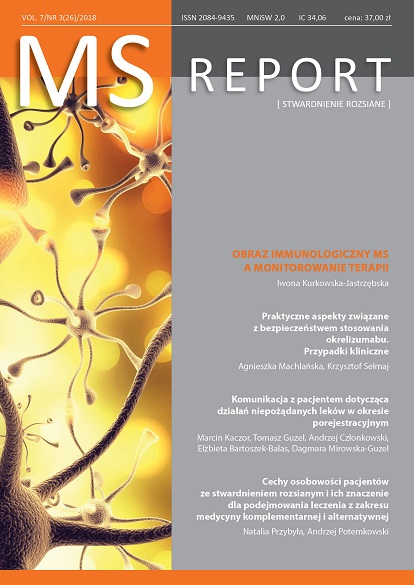Personality traits of patients with multiple sclerosis and their importance for undertaking therapies in the field of complementary and alternative medicine Original article
Main Article Content
Abstract
Among multiple sclerosis patients, there is an increasing interest in complementary and alternative methods of treatment (CAM). A wide range of CAM involves patients in the active treatment process, and obtaining information about them from other patients takes the form of support groups. The specificity of CAM seems to correspond to certain personality traits of patients with multiple sclerosis. The aim of the study was to find out whether the interest in CAM and, as a result, the decision to self-heal are conditioned by differences in the level of severity of specific personality traits of MS patients. 86 MS patients aged 18–71 were examined. Personality Inventory NEO-FFI was used to study personality traits, and information about the disease and CAM was obtained using a self-made questionnaire. Patients who declared the practice of CAM were characterized by a significantly higher level of intensity of the openness to experience than patients using only conventional treatment. Small differences were noticed in relation to the dimension of agreeableness, the severity of which was higher in people using yoga and massage. There was no relationship between the use of CAM and the specific features of the disease. Openness to experience seems to be a personality trait that can contribute to enhancing behaviors related to self-healing practices.
Article Details
Copyright © by Medical Education. All rights reserved.
References
2. Hauser S., Goodin D.: Stwardnienie rozsiane i inne choroby demielinizacyjne. W: Hauser S.L., Josephson S.A. (red.): Harrison. Neurologia w medycynie klinicznej. Tom II. Wydawnictwo Czelej, Lublin 2012.
3. Potemkowski A.: Problemy psychospołeczne. W: Losy J. (red.): Stwardnienie rozsiane. Wydawnictwo Czelej, Lublin 2013: 179-200.
4. Mirowska-Guzel D., Głuszkiewicz M., Członkowski A., Członkowska A.: Metody niekonwencjonalne stosowane u chorych ze stwardnieniem rozsianym. Farmakoterapia w Psychiatrii i Neurologii 2005; 1: 43-50.
5. National Center of Complementary and Alternative Medicine. Expanding Horizons of Health Care: Strategic Plan. 2008 [online].
6. Bowling A.C.: Medycyna niekonwencjonalna w stwardnieniu rozsianym. Neurol. Dypl. 2011; 6(6): 27-36.
7. Nayak S., Matheis R.J., Schoenberger N.E., Shiflett S.C.: Use of unconventional therapies by individuals with multiple sclerosis. Clin. Rehabil. 2003; 17(2): 181-191.
8. Honda K., Jacobson S.J.: Use of complementary and alternative medicine among United States adults: the influences of personality, coping strategies, and social support. Preventive Medicine 2005; 40: 46-53.
9. Heszen-Klemens I.: Poznawcze uwarunkowania zachowania się wobec własnej choroby. Ossolineum, Wrocław 1979.
10. Sirois M.F., Purc-Stephenson J.R.: Personality and consultations with complementary and alternative medicine practitioners: A five-factor model investigation of the degree of use and motives. J. Altern. Complement. Med. 2008; 14(9): 1151-1158.
11. Zawadzki B., Strelau J., Szczepaniak P., Śliwińska M.: Inwentarz osobowości NEO-FFI Costy i McCrae. Adaptacja polska. Podręcznik. PTP, Warszawa 1998.
12. Costa P.T., McCrae R.R.: Normal Personality Assessment in Clinical Practice. The NEO Personality Inventory. Psychological Assessment 1992; 4(1): 5-13.
13. Sugimoto A., Furnham A.: The health beliefs, experiences and personality of Japanese patients seeking orthodox versus complementary medicine. Complement. Ther. Med. 1999; 7(3): 175-182.
14. Olchowska-Kotała A.: Individual Differences in Cancer Patients’ Willingness to Use Complementary and Alternative Medicine. Adv. Clin. Exp. Med. 2013; 22(6): 855-860.
15. Carver C.S., Connor-Smith J.: Personality and Coping. Annu. Rev. Psychol. 2009; 61: 679-704. DOI: 10.1146/annurev.psych.093008.100352.
16. Bruce J.M., Lynch S.G.: Personality traits in multiple sclerosis: Association with mood and anxiety disorders. J. Psychosom. Res. 2010; 70: 479-485.
17. Zaghari L., Jomehri F., Baghari F.: The relationship between personality traits and Life Expectancy in Patients with Multiple Sclerosis. IRJ 2012; 10(15): 44-49.
18. Ceylan S., Hamzaoglu O., Komurcu S. et al.: Survey of the use of complementary and alternative medicine among Turkish cancer patients. Complement. Ther. Med. 2002; 10: 94-99. DOI: 10.1054/ctim.2002.0527.

